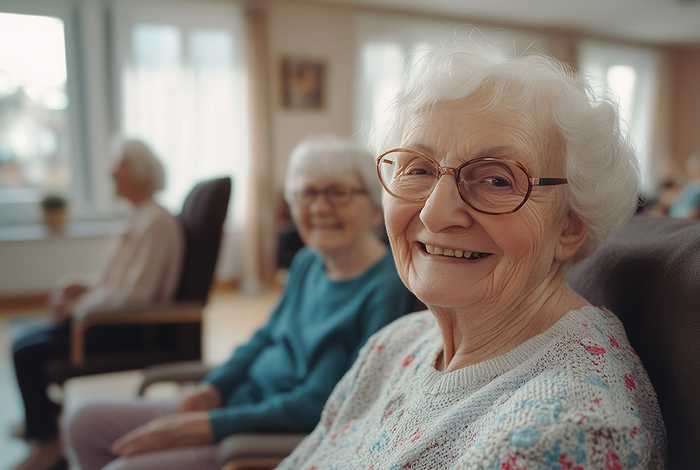Posted by Declan Davey
Technology for dementia: 6 innovations for better dementia care
Whilst we await a genuine dementia cure breakthrough, the development of different types of technology for dementia has been impressive in the past few decades.
Even if advancements to date don’t provide a cure, they can greatly help affected individuals maintain quality of life after a diagnosis.
In honour of World Alzheimer’s Month 2020, we’ll be discussing six modern innovations to keep an eye on:
- Dementia-Friendly Mobile Phones
- Medication Management
- Safety Monitoring Services
- Dementia Clocks
- Jelly Drops
- Robot Carers… The Future?
If you would like to find out more about World Alzheimer’s Month 2020, you can view this year’s campaign here.
Dementia-friendly mobile phones
Mobile phones have brought incredible access to information and opportunities since their invention, but they’re also a cause for dispute within some families.
Older adults who have spent most of their lives without a mobile phone may resist younger family members’ attempts to set them up with a smartphone.
Thanks to how technology for dementia has developed in recent years, there are now plenty of options for easy-use phones.
Features that are likely to benefit older adults with memory issues, limited dexterity, and/or poor vision include:
- Big buttons
- Large screen
- Long battery life
- Talking keys
- Emergency call button
- GPS tracking
Learning how to use new gadgets can be a significant challenge for people with dementia.
When in doubt, the more basic and straightforward a phone is to use, the better.
Medication management for dementia
Both family carers and patients have reported issues in medication management for dementia.
Clearly, missed medication poses a health risk.
But for people with memory impairments, remembering to take medication on time and at the correct dose can be a challenge.
Whether a person needs to take dementia-specific medication or other prescriptions, there are solutions at hand.
These range from basic dosette boxes (with written prompts for each day of the week) to automatic pill dispensers.
Automatic pill dispensers may be particularly suitable for people with dementia who are living on their own.
They can also be a useful reminder for family carers who are leading busy lives alongside caring duties.
Depending on the type of dispenser, it will sound an alarm, vibrate, or flash a light at preset times.
This technology makes medication management a more user-friendly experience.
Safety monitoring services
Another excellent example of technology for dementia patients is the safety monitoring services offered by companies like Telecare.
Telecare connects vulnerable adults to a remote support system.
If a Telecare-user falls or feels ill, they can press their pendant alarm to speak with a trained agent.
This option could be valuable for someone who lives on their own and doesn't have frequent visits from family, friends, or home carers, but wants to keep their independence.
Help is available 24/7, providing peace of mind to everyone involved.
Dementia clocks
Most people need a sense of routine for mental wellbeing. This is no different for older adults.
Being confused about the time of day can be anxiety-provoking for people living with dementia.
Regular clocks are harder to understand as cognitive impairment progresses.
But fortunately, there is a wide variety of specially-designed dementia clocks to choose from.
Available technology includes easy-read digital display clocks, as well as day and night clocks.
Another option for more tech-savvy individuals is a mobile phone app that shows the time of day (morning/afternoon/evening) and event reminders.
Jelly Drops to prevent dehydration
Jelly Drops was invented by Lewis Hornby, a young man whose grandmother with dementia ended up in hospital from dehydration.
Lewis spent a year and a half consulting with doctors to test and develop the drops.
But what makes them unique?
They’re designed to encourage people to stay hydrated whilst also enjoying a sweet treat.
Available in six fruity flavours, the drops are 95% water, sugar-free, vegan, and easy-to-chew.
Whilst not strictly “technology,” this is a great example of innovation in dementia care.
In fact, the Alzheimer’s Society has publicly supported the drops as a tool for dehydration prevention.
Robot carers… The future?
In October 2019, the UK government announced a £34 million support fund to develop “health care robots.”
Can you expect to see robot carers near you anytime soon?
Not just yet…
The first priority is to teach the robots how to show empathy.
After all, a “human touch” is one of the fundamentals of high-quality care.
One in seven people are predicted to be over the age of 75 by 2040, and the risk of dementia increases from age 65 to 80 and beyond.
Whilst the idea will seem strange to many at present, these care robots are being built to supplement the adult social care sector.
Tasks they may be able to help with include:
- Assistance following a fall
- Delivering food
- Medication reminders
- Raising the alarm
If all goes to plan, the health care robots could become part of mainstream technology for dementia care and support.
Need some help during World Alzheimer’s Month?
Our friendly team at Autumna is here to provide advice if you’re researching options for dementia support.
Whether you need more information on dementia and technology, or you have a separate question about later life care, you can contact us by phone or email below.
If you’re concerned about your memory or have a medical query, we suggest that you contact your GP practice.
Phone: 01892 335 330
The line is open Monday to Sunday (8:30am - 5:30pm Mon-Fri, 10am - 5pm Sat, 10am - 4pm Sun).
Email: info@autumna.co.uk
Website Resources:
Thanks for reading,
Autumna
Other articles to read
Autumna Blog

Older Persons Care Advice
Ultimate guide to care homes in Norwich
April 23rd, 2025
Discover the best care homes in Norwich—explore lifestyle-focused options, top-rated services, and how to choose the right home with confidence.

Older Persons Care Advice
How to find an adult day care centre near you
April 22nd, 2025
Looking for an adult day care centre near you? Discover how to find safe, joyful care for your loved one—and support for yourself—on Autumna.

Older Persons Care Advice
How to shortlist care homes in Exeter
April 17th, 2025
Need help shortlisting care homes in Exeter? Learn how to filter options with confidence, compare homes, and find the best fit with Autumna’s free tools.






